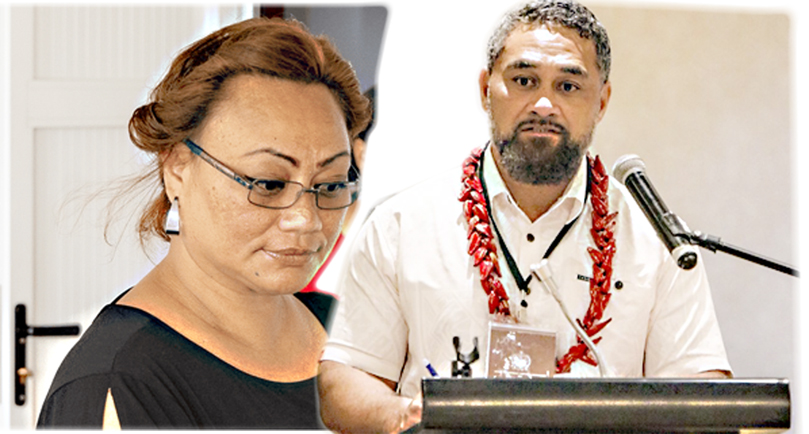Legal counsel Mathew Lemisio mounts strong defence for Mrs Perkin Feagia’i Headle (left), accused of intentionally harassing FAST Party leaders on social media.

By Staff Reporter
Digital Forensics Analyst for the Ministry of Police, Mr Timothy Komiti admitted in Court on Monday that URLs for Facebook pages are not full proof and can be compromised.
Mr Komiti’s admission came during cross examination by counsel, Mr Mathew Lemisio, who is representing Mrs Perkin Feagia’i Headle.
Mrs Headle is accused by the prosecution of intentionally initiating online communication with the intention to harass FAST Party leaders thus causing them significant distress on a Facebook page by the name Salote Syra Tautai.
None of the FAST leaders mentioned in the Police charges took the stand to testify against Mrs Headle.
Mr Komiti, who has formal training on abstracting and securing online data, was the last witness for the prosecution to give evidence.
During his evidence in chief, he and lead prosecutor, Mrs Leinafo Taimalelagi-Strickland took the court through two “screen recordings” that shows the contents of the Facebook pages Salote Syra Tautai and separately the Facebook page by the name Tuifa’asisina Perkin Headle.
The first video clip according to the witness was taken on the 8th of September 2022 while the second one was taken on the 14th of October 2022.
In the first “screen recordings” it shows photos, videos and postings of what appeared to be those of Mrs Headle.
Mr Komiti also pointed out from the clips that the two pages are linked through a Facebook URL, or a Uniform Resource Locator. According to the witness a URL is a unique address like online character allocated to every Facebook page and cannot be shared.
The witness and the prosecution focused their analysis of the first video clip in Court on the contents posted on the 25th of August 2022.
However when crossed examined, Mr Lemisio asked the witness that it is a fact that URLs are not full proof and can be compromised in certain ways.
Mr Komiti agreed with the defense counsel that URLs are vulnerable to attacks but said he did not know how this is done.
There is a general understanding based on research that Facebook URLs can be compromised in certain ways.
One way is known as phishing, where cybercriminals create Facebook pages that look like the page that they want to attack then send links through mass email chains.
Once the person responds to these emails by clicking the links, that is when they take full control of that page’s log in credentials.
Mr Lemisio then turned Mr Komiti’s attention to the video clips where he asked him why the first video clip, taken on the 8th of September 2022 failed to capture the contents that are appearing on the second video clip taken on the 14th of October 2022 of 25th August 2022, if he is claiming that the Salote Syra Tautai page is the same as the Tuifaasisina Perkin Headle page.
Mr Komiti said he did not know.
That is when Mr Lemisio put it to the witness that the only explanation for such difference in the contents on the pages on the same date is the result of a URL being compromised.
Mr Komiti agreed.
Earlier in the cross examination, Mr Lemisio asked Mr Komiti whether the computer that he was using to play the video recordings in Court was the same computer that he used to capture the recordings.
Mr Komiti said no. He was then asked who he gave the first recording to. The witness replied that he gave it to Inspector Paul Tauaa, because it was him who instructed him to capture the recordings.
Inspector Tauaa was not a witness in these proceedings.
When asked how many times that he accessed these recordings after he handed them to Inspector Tauaa, Mr Komiti said more than one time.
The most recent time was the day before he gave evidence. It was then revealed during this part of the examination that the videos that were played in Court were not the “master copies” of the screen recordings.
Mr Komiti said the master copies were in the computer that he used at the Office to record the screen shots.
Asked whether there is a log book to track who access these evidence, Mr Komiti said there was nothing and that he can access it anytime he wants despite the fact that he has a supervisor.
At one point, Her Honour Judge Alalatoa Rosella Papalii asked the witness how he accessed the pages that he screen recorded.
Mr Komiti said he used his personal Facebook page, not the official page of the Ministy.
Mr Lemisio then followed up by asking the witness why his personal Facebook details did not appear in the screen recordings.
The witness said that the technology he used to capture the recording has a function where he can exclude information from the final recording.
Mr Lemisio asked the witness whether the Ministry of Police has a working partnership with Facebook.
Mr Komiti said there is. Asked why they didn’t tap into that partnership for assistance to gather key evidence to assist them with their investigation.
The witness said that the only way that they can tap into this partnership is by way of a warrant.
Mr Lemisio then asked him if they had sought that warrant? Mr Komiti said they did not.
The matter is now adjourned until late May for counsels from both sides to submit closing submissions before Her Honour delivers her final decision.
